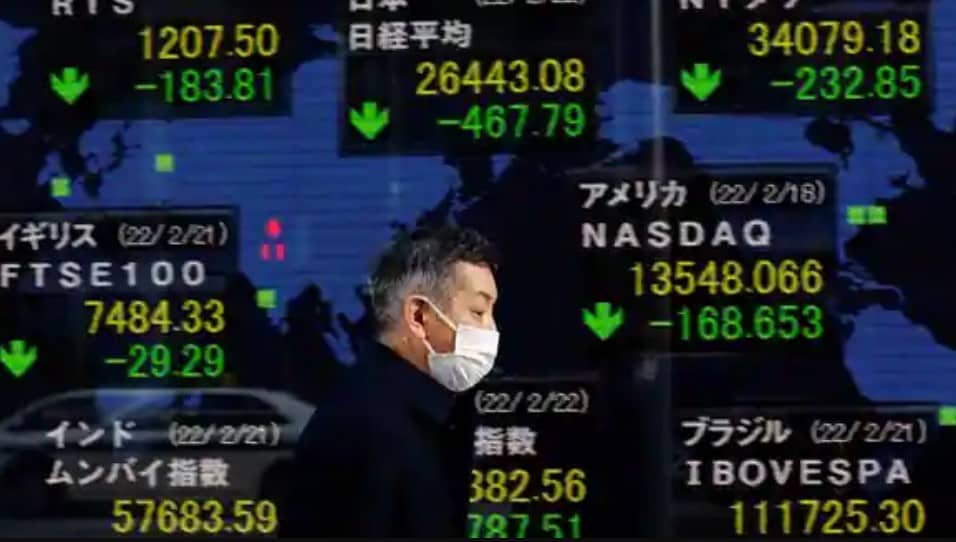
To paraphrase JP Morgan banker Jamie Dimon’s advice to investors and analysts this week, everything looks pretty good except the possibility that something really bad could happen.
The stock market, so far, has largely recapitulated its pattern from past wars: sell the rumor, buy the news. The S&P 500 hit a recent low on Feb. 23, the day before Russia’s invasion. It’s up 167 points since then.
A Canadian fund manager made news by advising his investors to keep buying stocks because in an all-out nuclear war their portfolio allocation would be irrelevant anyway. Looking back and trying to explain a modest 7% drop during the Cuban missile crisis, economists reached for a similar explanation: There’s no point discounting a worst-case outcome because nobody will be around to benefit from a wise investment decision.
Fritz Todt, who built the autobahn, told Hitler in November 1941 the war could not be won and must be ended politically. Hitler responded: “I can scarcely still see a way of coming politically to an end.”
The führer was talking his book. Negotiated endings are always on the cards, as they now could be for Vladimir Putin. There was no “existential” risk for Germany. Even under the rigorous terms actually imposed—unconditional surrender—Germany survived and quickly was on its way to becoming the leading state in Europe. The “existential” risk belonged to Hitler; under any settlement that might be envisaged, he would have had to leave power and accept accountability for his crimes.
Mr. Putin, in astonishingly short order, has turned his Ukraine lark into a similar risk not for Russia but for Mr. Putin. Hence a heating up of the rhetoric recently. RIA Novosti, an official Moscow news service, issued a bloodcurdling call for the liquidation of Ukraine. Sergey Karaganov, a leading Putin intellectual, told a Western interviewer, “The stakes of the Russian elite are very high—for them it is an existential war,” and gave voice to a hail Mary scenario in which nuclear threats cause the U.S. to abandon NATO.
And despite Washington having supplied Ukraine’s military for years, a démarche this week from the Russian Embassy demands the U.S. stop and warns of “unpredictable consequences.”
I first mentioned the Hitler-Todt episode in this column in 2014, in anticipation of Mr. Putin bringing the world to such moment. It is difficult not to imagine him now fingering his weapons of mass destruction, particularly his tactical nuclear warheads, and wondering if they might offer a way out of his dilemma—a concern publicly aired this week by CIA Director William Burns.
Only one answer would seem to fit the situation: a clear signal to Mr. Putin that, in such a case, NATO airpower will join the war on Ukraine’s side and reduce most of his standing army to a smoldering wreck. Where the decisive ground battle is now shaping up in eastern Ukraine, the open terrain is especially conducive to such an aerial campaign.
The logic of preserving his army to fight another day will be hard for Mr. Putin to ignore if he hopes to stay in his job. Seven weeks of war have also been useful: He and his domestic allies have had a chance to wrap their heads around the possibility of defeat. For his colleagues, moreover, an easy decision is not to see everything they value destroyed for the sake of a man they’ve come to loathe personally.
One way or another, the U.S. is likely to find itself moving closer to center stage in the conflict and its endgame. Germany and others resist cutting Mr. Putin’s vital energy dollars not just out of concern for their own economies; they don’t crave the risks and uncertainties that come with making Mr. Putin’s position in Moscow terminally untenable. Probably Mr. Biden’s advisers, except a few militants, agree. And if anything can get China’s Xi Jinping off the sidelines and working with the U.S. and Europe in Ukraine, it will be a desire not to see Mr. Putin humiliated.
Only the Ukrainians themselves, having experienced Russian occupation and seen that it means acquiescing in the mass murder of civilians, are a likely voice of realism and spine-stiffening. Lately recalled have been JFK’s words about the necessity of leaving Khrushchev an exit route. In Mr. Putin’s case, the advice is too late. With his blunders and miscalculations, his survival is now in his own hands; he has left the allies nothing to work with. Joe Biden’s alleged rhetorical excesses may be all that—calling Mr. Putin a war criminal, referring to genocide (not an unreasonable interpretation of recent Russian rhetoric), saying Mr. Putin should not remain in power.
My guess is these out-of-school expostulations pop out for a reason—because the consensus after so many hours of White House discussion is that Mr. Putin is likely beyond saving no matter what the U.S. does.